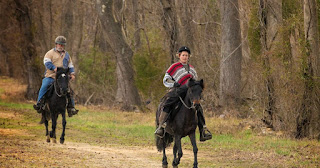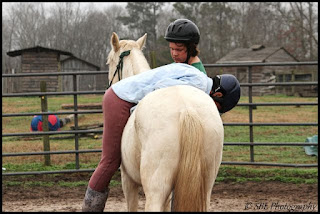It is certainly affecting mine. I have to work very hard to fight it off both consciously and subconsciously. There is the general, pervasive feeling of frustration that comes about each time I am ready to really roll out a new, expanded program only to see a new variant of the virus come around.
It has made teaching more complicated. I have always been alert to safety issues, but now it seems that the need to protect my riders is stifling the need to teach them. I also have found myself doing something that I have never done before, being fearful about the health of others.
I have painful, new responsibilities at the horse lot. In the past I have had to decide which songs to teach the kids in the music program. That was my most difficult musical decision. Now I have to consider whether bringing everyone in to learn a new song could lead to someone's death.
Perhaps as insulation against future pain, I find that I have lost my emotional connection to individual horses. This is a risky time to become emotionally invested in anything. Every time I hear a damn phone ring I know that it could be another call about another death. I despised phones before the pandemic, but now I am at loss to see how anyone can surrender their piece of mind to those devices.
This shows up more when working an untrained horse in the round pen than anywhere else. For well over a decade, within a few moments of entering the round pen I reach a level, both of calm and focus, that draws the horse to me in a way that appears magical to those who do not know any better. That is gone now. Instead of focus, all I feel is emotional static in the round pen.
Just as I see myself pulling away from emotional connection, I see others being pulled into more "worry" about their horses. Some are deeply concerned with any change in the weather, or even if a horse walks a bit slow one day. I don't blame them. I understand. When one spends each waking moment is with low grade fear for the health and safety of loved ones, before long it is going to spill. over.
And the horses are acting different than they have ever acted. They are high strung, nervous, and exponentially more vocal than our herds have ever been. I have been writing this off to being ridden less during hunting season and to exceptionally high energy hay that resulted from our warm, wet summer. But I have my doubts.
All horses are sensitive to the emotions of the humans around them. Horses that were born wild or are only a generation or two from the wild are super sensitive to those emotions. Stressed people stress horses. Are our horses being affected by constant exposure to humans who are awash in cortisol? I am afraid so.
But this will end. Throughout history that has been the case. And when it does, I intend for my relationship with my horses and my riders to go back to what it once was. But it will not happen by itself. I will have to be very deliberate in my efforts to become one with horses the way that I used to. I will have to be careful to examine every thought, every assumption, every changed behavior, in order to determine if it is a true and sound belief or if it is one of the side effects of living in this very strange time.
I suspect that many of you will have to do the same thing.





